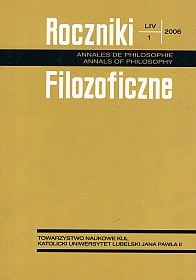On the Principle of Sufficient Reason
Abstract
The aim of this paper is to defend the Principle of Sufficient Reason (PSR). I analyse various versions of this principle (and their structure) and various ways of justifying it. Then I present and attempt to challenge some counterexamples allegedly refuting a universal application of the PSR. One can distinguish three versions of the PSR: for each state of affairs there is a sufficient reason for its obtaining (PSR-O); for each true proposition there is a direct or indirect justification (PSR-E); for each state of affairs there exists an intellectual duty to search for a sufficient reason for obtaining of that state of affairs, and for each known true proposition – to search for its justification (PSR-M). There are standard and non-standard versions of the PSR-O. The PSR-Ostand can be only valid if there are no chains of contingent reasons and outcomes with first modules, i.e. all chains are actually infinite. However, there are serious (yet debatable) arguments against the possibility of such infinity. The necessary condition of the PSR-Onon-stand universal working is the existence of a necessary substance (thing): that substance would be a (free) reason of certain contingent states of affairs obtaining in its domain, and those states of affairs would then be reasons for all other contingent state of affairs and things. (The principle does not require a necessary substance to have its own reason). Limiting the chain of reasons to contingent states of affairs ended with a necessary state (if this state is a reason by necessity) would lead to the paradox of universal necessarism. An ontological “cost” of holding the PSR-Onon-stand is a postulate of the existence of the necessary, supra-natural substance, i.e. God. However, there are serious advantages of the view which accepts that the PSR-Onon-stand is generally valid: a nomological unity of the world and explanatory simplicity.
References
Ajdukiewicz K.: Dowód a wyjaśnienie, [w:] tenże, Język i poznanie, t. II: Wybór pism z lat 1945-1963, Warszawa: PWN 1985, s. 401-408.
Banaszkiewicz A.: Principium contradictionis oraz Pirincipium rationis sufficientis w ontologii Christiana Wolffa, Łódź: UŁ 2001, mps.
Bissinger A.: Die Struktur der Gotteserkenntnis. Studien zur Philosophie Christian Wolffs, Bonn: H. Bouvier und Co. Verlag 1970.
Błaszczyk P.: Przyczynowa struktura świata, [w:] A. J. Nowak, L. Sosnowski (red.), Słownik pojęć filozoficznych Romana Ingardena, Kraków: Universitas 2001, s. 240-245.
Błaszczyk P.: Zdarzenie II, [w:] Słownik pojęć filozoficznych Romana Ingardena, red. A. J. Nowak, L. Sosnowski, Kraków: Universitas 2001, s. 320-322.
Davis B.: An Introduction to the Philosophy of Religion, Oxford–New York: Oxford University Press 1982.
Geirsson H., Losonsky M.: Beginning Metaphysics. An Introductory Text with Readings, Malden–Oxford: Blackwell Publishers 1998.
Grzegorczyk A.: Zasada racji dostatecznej (na marginesie artykułu Barbary Skargi Racja i bycie), „Przegląd Filozoficzny” (nowa seria) 1993, nr 3, s. 99-102.
Hoffman J., Rosenkrantz G. S.: The Divine Attributes, Oxford–Malden: Blackwell Publishers 2002.
Inwagen P. van: Metaphysics, San Francisco: Westview Press 1993.
Jadacki J. J.: Spór o granice istnienia, Warszawa: WFiS UW 1998.
Leftow B.: On a principle of sufficient reason, „Religious Studies” 39 (2003), s. 269-286.
Leibniz G. W.: Zasady filozofii, czyli monadologia, przeł. S. Cichowicz, [w:] G. W. Leibniz, Główne pisma metafizyczne, Toruń: Comer 1995, s. 113-134.
Nozick R.: Philosophical Explanations, Cambridge, Mass.: The Belknap Press of Harvard University Press 1981.
Perzanowski J.: Teofilozofia Leibniza, [w:] G. W. Leibniz, Pisma z teologii mistycznej, przeł. M. Frankiewicz, Kraków: Znak 1994, s. 243-351.
Post J. F.: The Faces of Existence. An Essay in Nonreductive Metaphysics, Ithaca and London: Cornell University Press 1987.
Post J. F.: Metaphysics. A Contemporary Introduction, New York: Paragon House 1991.
Rescher N.: The Riddle of Existence. An Essay in Idealitic Metaphysics, Lanham–New York–London: University Press of America 1984.
Rowe W. L.: The Cosmological Argument, Princeton and London: Princeton University Press 1975.
Rowe W. L.: Cosmological Arguments, [w:] A Companion to Philosophy of Religion, ed. P. L. Quinn, Ch. Taliaferro, Oxford: Blackwell Publishers 1999, s. 331-337.
Stępień A. B.: Wstęp do filozofii, Lublin: TN KUL 2001 (wyd. IV).
Stróżewski W.: Ontologia, Kraków: Aureus i Znak 2004.
Swinburne R.: The Existence of God, Oxford: The Clarendon Press 1987 (reprint z 1979).
Wojtysiak J.: Coś musi istnieć (W związku z artykułem P. van Inwagena „Dlaczego w ogóle cokolwiek istnieje?”), „Roczniki Filozoficzne” 48 (2000), z. 1, s. 55-77 [There Must Be Something (in Reference to the Paper by Peter van Inwagen Why Is There Anything at All?), „Studies in Logic and Theory of Knowledge”, vol. 5, ed. S. Kiczuk, J. Herbut, A. B. Stępień, Lublin: TN KUL 2002, s. 259-279].
Wolff Ch.: Philosophia prima, sive Ontologia, methodo scientifica pertractata, qua Omnis Cognitionis humanae principia continentur, Editio Nova priori emendatior, Francofurti et Lipsiae: Officina Libraria Rengeriana 1786.
Copyright (c) 2006 Roczniki Filozoficzne

This work is licensed under a Creative Commons Attribution-NonCommercial-NoDerivatives 4.0 International License.





